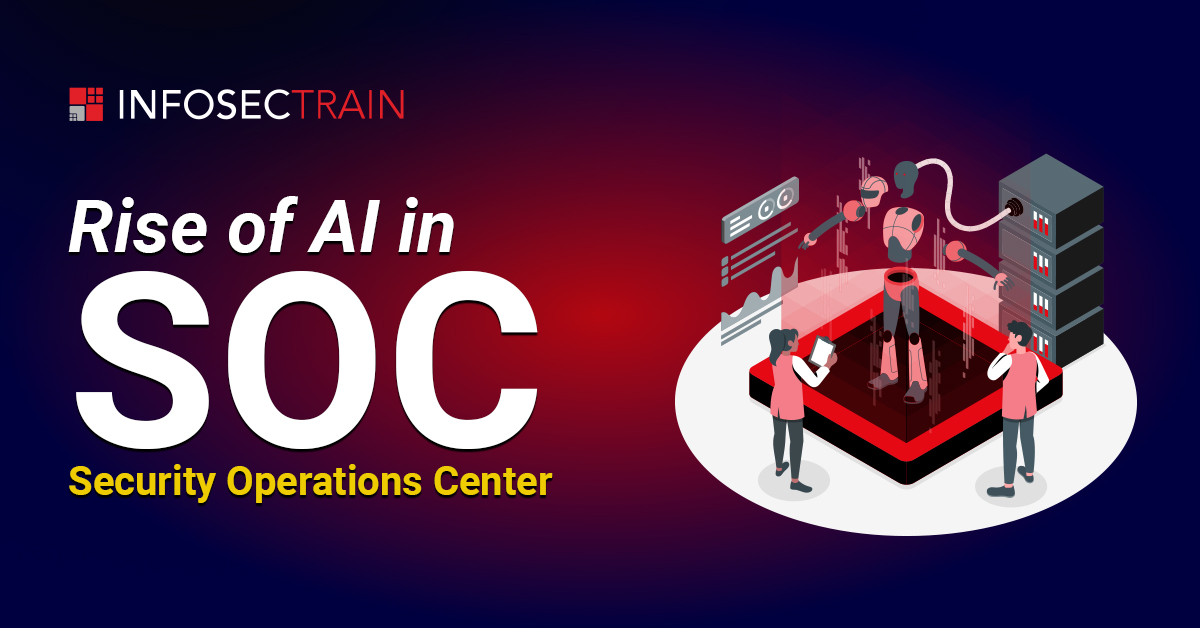The rise of AI in Security Operations Centers marks a revolutionary change in cybersecurity capabilities. Through leveraging machine learning, automation, and advanced analytics, AI equips SOCs to identify, analyze, and counter threats swiftly, accurately, and efficiently. Unlocking AI's complete potential demands a comprehensive strategy that tackles technical, ethical, and operational aspects. As businesses increasingly adopt AI-driven SOC solutions, they must stay alert in mitigating bias, ensuring data integrity, and adhering to ethical standards to optimize the reliability and efficacy of their cybersecurity measures.
What is the Concept of Security Operations Centers (SOC)?
A Security Operations Center (SOC) functions as a centralized unit in an organization, actively monitoring, detecting, investigating, and responding to security threats. It serves as the command center for the organization's cybersecurity initiatives, primarily safeguarding its data, applications, and systems from various cyberattacks.
Rise of AI in Security Operations Centers
Artificial Intelligence (AI) is revolutionizing Security Operations Centers (SOCs), altering how security professionals identify, investigate, and counter cyber threats. This transformation entails a shift in the methods employed by security experts to detect, analyze, and respond to potential security breaches. With AI integration, SOCs can enhance their capabilities in real-time threat detection, enabling proactive measures against evolving cyber threats.
What are the Benefits of AI in SOC?
1. Enhanced Threat Detection:
AI-powered algorithms enable Security Operations Centers (SOCs) to analyze extensive datasets in real-time, enhancing their ability to identify patterns, anomalies, and potential threats more efficiently than traditional methods. This enhances threat detection capabilities, empowering organizations to swiftly and effectively respond to security incidents.
2. Improved Incident Response:
AI-driven automation enhances incident response in Security Operations Centers (SOCs) by streamlining workflows and automating tasks like log analysis, incident triage, and threat prioritization. This allows human analysts to concentrate on complex cybersecurity matters, leading to quicker and more precise incident response time.
3. Scalability and Efficiency:
AI-powered SOC solution’s scalability and efficiency are inherent advantages, as they can rapidly scale and manage vast amounts of data. This enables organizations to effectively adapt to dynamic threat environments and fluctuating workloads, ensuring the resilience and strength of their cybersecurity defenses.
4. Reduction of False Positives:
AI algorithms are crucial in decreasing false positives generated by security monitoring systems. Through advanced analytics and machine learning techniques, AI-driven solutions effectively discern between authentic security threats and benign anomalies. Reducing false alarms alleviates alert fatigue, allowing SOC Analysts to concentrate more on authentic security incidents.
What are the Challenges of AI in SOC?
1. AI Bias and Fairness:
AI Bias and Fairness pose a significant hurdle for AI implementation in SOCs, as algorithms may unintentionally favor or discriminate against specific individuals or groups. Such biases can result in distorted decision-making and inaccurate threat evaluations, ultimately compromising the effectiveness and impartiality of SOC operations.
2. Data Quality and Availability:
The quality and accessibility of data significantly influence the effectiveness of AI in SOCs. Providing AI algorithms with diverse, representative, and high-quality datasets is crucial to train accurate and robust models. However, challenges such as incomplete or inaccurate data can impede the performance of AI-driven systems, leading to unreliable outcomes.
3. Regulatory and Compliance Requirements:
Meeting regulatory and compliance standards like GDPR, HIPAA, and PCI-DSS poses extra hurdles for AI-driven SOC operations. It's crucial to ensure that AI algorithms comply with legal and ethical norms concerning data privacy, consent, and transparency to maintain regulatory adherence and prevent potential legal consequences.
4. Adversarial Attacks:
Adversarial attacks represent a rising threat in AI-powered SOC environments, where malicious actors intentionally manipulate AI algorithms to avoid detection or trigger false alarms. Establishing strong defenses against such attacks and ensuring the resilience of AI-driven systems against manipulation is vital for upholding the integrity and efficacy of SOC operations.
SOC Expert Course With InfosecTrain
InfosecTrain is a renowned technology and security training and consulting firm offering various IT security courses and services worldwide. Our SOC Analyst training aims to provide you with both the technical and soft skills necessary to thrive in a Security Operation Center (SOC) environment. Whether mastering the intricacies of threat detection or honing communication and problem-solving abilities, our course aims to prepare you comprehensively for the challenges of working in a SOC.

